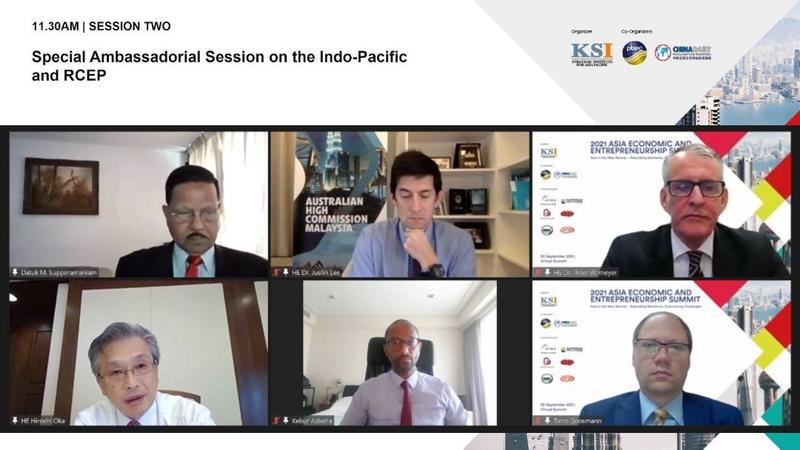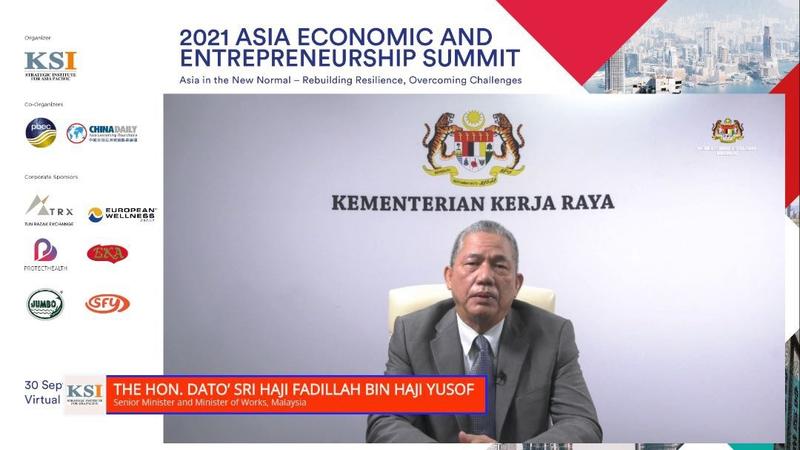 Representatives of foreign countries stationed in Malaysia address the 2021 Asia Economic and Entrepreneurship Summit on Sept 30, 2021. (Top row left to right) Moderator Datuk M. Suppermaniam, former Malaysian Ambassador to the World Trade Organisation; Dr. Justin Lee, High Commissioner of Australia to Malaysia; Dr. Peter Blomeyer, Ambassador of Germany to Malaysia. (Bottom row left to right) Hiroshi Oka, Ambassador of Japan to Malaysia; Mr Kebur Azbaha, Head of Prosperity and Economics Team, High Commission of the United Kingdom in Malaysia; and Mr Timo Goosmann, Head of Section-Political, Press and Information, Delegation of the European Union to Malaysia. (PHOTO PROVIDED TO CHINA DAILY)
Representatives of foreign countries stationed in Malaysia address the 2021 Asia Economic and Entrepreneurship Summit on Sept 30, 2021. (Top row left to right) Moderator Datuk M. Suppermaniam, former Malaysian Ambassador to the World Trade Organisation; Dr. Justin Lee, High Commissioner of Australia to Malaysia; Dr. Peter Blomeyer, Ambassador of Germany to Malaysia. (Bottom row left to right) Hiroshi Oka, Ambassador of Japan to Malaysia; Mr Kebur Azbaha, Head of Prosperity and Economics Team, High Commission of the United Kingdom in Malaysia; and Mr Timo Goosmann, Head of Section-Political, Press and Information, Delegation of the European Union to Malaysia. (PHOTO PROVIDED TO CHINA DAILY)
Infrastructure and advancements in technology will play a key role in Asia’s recovery, as the region prepares for the gradual reopening of an economy that was devastated by the pandemic, according to analysts and officials who participated in a regional economic forum on Sept 30.
Participants in the Asia Economic and Entrepreneurship Summit also encouraged Asian economies to ratify free trade agreements – like the Comprehensive and Progressive Agreement for Trans-Pacific Partnership and the Regional Comprehensive Economic Partnership – as they will help sustain growth in the post-pandemic era.
Analysts and officials have likewise encouraged a more inclusive and climate-friendly development path – aligned with the socio-economic targets set under the UN Sustainable Development Goals and the Paris Climate Treaty.
Participants in the Asia Economic and Entrepreneurship Summit also encouraged Asian economies to ratify free trade agreements – like the Comprehensive and Progressive Agreement for Trans-Pacific Partnership and the Regional Comprehensive Economic Partnership – as they will help sustain growth in the post-pandemic era
The AEES is an annual regional economic forum organized by the Kuala Lumpur-based think tank KSI Strategic Institute for Asia Pacific, the Pacific Basin Economic Council and China Daily.
In his welcome speech, KSI President Michael Yeoh said that Asia needs “innovation, investment and infrastructure” for economic rebound and sustained growth.
ALSO READ: Pivot to ASEAN and RCEP for trade hub growth?
At the same time, he said economic recovery “also requires inclusive and sustainable development, and a much stronger commitment” to UN SDGs. Asian governments also need to address some of the key challenges posed by environmental degradation, as well as climate change, added Yeoh.
Jayant Menon, visiting senior fellow at ISEAS - Yusof Ishak Institute in Singapore, said that in planning for post-pandemic growth, governments in the region need to shift their focus from the short term to a more long-term agenda. He noted that the spike in unemployment, poverty and inequality “will not go away anytime”.
He said resolving these issues should be prioritized and in order to do so, Asian economies “need to push back on the rise in the anti-globalization force”.
“And one such pushback is to start thinking about how we can open borders safely. (Borders have) been closed for too long in Asia,” he said.
“The lack of progress with the SDGs leading up to this pandemic has made its impact even worse. This is a vicious circle that we need to break somehow,” Menon said.
ALSO READ: The world will benefit if China gains entry into CPTPP
Fadillah Yusof, Malaysia’s Senior Minister of Works, said in his opening keynote address that access to “reliable, quality, efficient and affordable infrastructure services” is critical in reducing poverty, promoting economic growth, supporting social development and building resilient communities.
He said in Malaysia, infrastructure development is one of the main drivers of economic growth and the construction sector is set to move in tandem with UN SDGs.
Guo Wanda, executive vice president of Shenzhen-based China Development Institute, said that digital economy has become very important for China's economic growth. He also cited the fast growth in high-tech manufacturing and the manufacturing of electric vehicles as well as China’s move towards a carbon-neutral economy.
 Dato Sri Haji Fadillah bin Haji Yusof, Malaysia's Senior Minister of Works, stresses access to "reliable, quality, efficient and affordable infrastructure services" at the 2021 Asia Economic and Entrepreneurship Summit on Sept 30, 2021. The annual regional economic forum is co-organized by the Kuala Lumpur-based think tank KSI Strategic Institute for Asia Pacific, the Pacific Basin Economic Council and China Daily. (PHOTO PROVIDED TO CHINA DAILY)
Dato Sri Haji Fadillah bin Haji Yusof, Malaysia's Senior Minister of Works, stresses access to "reliable, quality, efficient and affordable infrastructure services" at the 2021 Asia Economic and Entrepreneurship Summit on Sept 30, 2021. The annual regional economic forum is co-organized by the Kuala Lumpur-based think tank KSI Strategic Institute for Asia Pacific, the Pacific Basin Economic Council and China Daily. (PHOTO PROVIDED TO CHINA DAILY)
Andrew Weir, chairman of PBEC, compared the rise of the digital economy to the industrial revolution and how it changed -- and will continue to change -- the operations of companies and governments around the world.
Manu Bhaskaran, chief executive officer of Singapore-based think-tank Centennial Asia Advisors, said “the multiple revolutions in technology are … going to be immensely constructive for world economic growth”. Apart from digital technology and other IT-related areas such as Artificial Intelligence and Internet of Things, he also cited the breakthroughs in renewable energy, fintech and biomedical areas.
READ MORE: Use SDGs to fight climate change
Justin Lee, High Commissioner of Australia to Malaysia, cited the importance of free trade agreements such as RCEP and CPTPP. He said an "open and inclusive" Asia-Pacific region needs an "open and rules-based" regional and global trading system.
“Free trade drives economic growth, improves living standards and creates the conditions for peaceful coexistence. Trade also develops cooperation, builds trust and encourages respect between trading parties, and to support that free trade, trade rules are critical,” he said.
Lee said Australia supports RCEP and CPTPP, noting that the country is now moving to ratify RCEP and commended Japan, China and Singapore for ratifying the world’s largest free trade pact.



